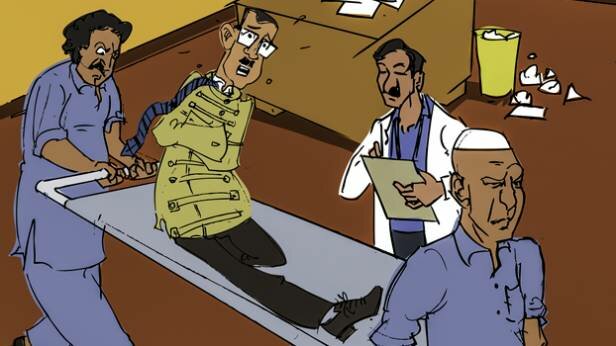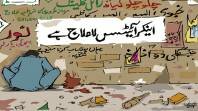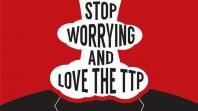Chlamedia is an electronically transmitted disease (ETD) that can prove life threatening in heavy doses. Passed on in the form of short wave radio signals from booster to booster, Chlamedia is a collection of bacterial life forms normally seen on television screens.
There are different strands of the virus. The Malik Bahria strand is perhaps the most well known, the infection that makes people take large sums of money to engage in heated discussions with other people who have taken large sums of money; though the MSR strand is fast becoming the leading epidemic in the country, the version of the virus that induces corporate egomania.
The effects of the disease on the general population are devastating.
People come home from a hard day of doing nothing at work and instead of arguing with their spouses, as is traditionally done, they sit in front of a television and watch other people arguing instead. No plates or dishes are broken, but they do often feel like getting up and breaking the screen.
Watching for ten minutes can cause elevated blood pressure, hysterical laughter, face palms. Watching for longer may result in cessation of vital organs. Other symptoms include disillusionment with the democratic political process, and filling out immigration forms for England.
Treatment can prove very difficult; precaution is the only life saver here. Doctors the world over suggest a safe viewing distance for the television. In Pakistan, that comes to something like a thousand kilometers. Leading biologist Dr. Amir Nazakat says that the only known cure is to conduct live telecasts from Saudi Al-Arabia Wal-Riyal. Another expert on mental health, Dr. Shayed Masood, suggests that slowly poisoning the patient with controlled exposure to news channels might help build a natural immunity.
“They can watch my programme, or Mubashir or Mehr’s, but not longer than one minute at a stretch. It’s too dangerous.”
All conventional attempts at treatment, antibiotics, steroids, lobotomies, have failed. While the number of people infected gets larger every day. Still larger are the social costs that are going to be incurred, experts predict a complete breakdown in the social fabric from watching prime time television.
“I used to be a happy, trusting sort of person. Then I started watching the evening talk shows. The things they said. Now I don’t even trust my own mother. I’ve started suspecting the milkman of being an Indian agent, I let my cat drink it first just to see if it isn’t poisoned,” says Salman, a chartered accountant.
“I’m afraid to buy potato chips from the store, I think they are all made from pigs. I’ve lost interest in watching cricket because every ball of every match has millions of rupees of fixing. I can’t drink bottled water for fear of mind control, I’ve started feeling responsible for the target killings in Karachi, when they say it’s done by unnamed assailants who could be sitting watching at home,” he continues.
“My therapist says I should have my cable service disconnected, but my wife has to watch Turkish dramas. I went almost a week without watching any evening shows, then yesterday I…I switched it on at eight. It was Javed Chaudhry. Oh god…”
Salman’s eyes fill up with tears. Salman is just one of the many young men in this country adversely affected by the television media. Many resort to drugs and alcohol as a coping mechanism.
“If you listen to what they say, sometimes it’s nobody’s fault, then it’s everybody’s fault, there are new accusations of taking bribes every evening, documents flying everywhere, plots, cars, brown paper bags full of cash, government employees, ministers, anchorpersons, generals, majors, lawyers, judges...it’s enough to drive anyone crazy,” says Omar, 28, who’s on a forced break from television after an intervention by concerned family members.
The withdrawal is brutal, he is sitting in a corner visibly shaking. “I haven’t heard a single wild accusation against a public figure in over a month. The urge to lose all faith in humanity is too much to bear.”
The writer is a journalist based in Islamabad.




















